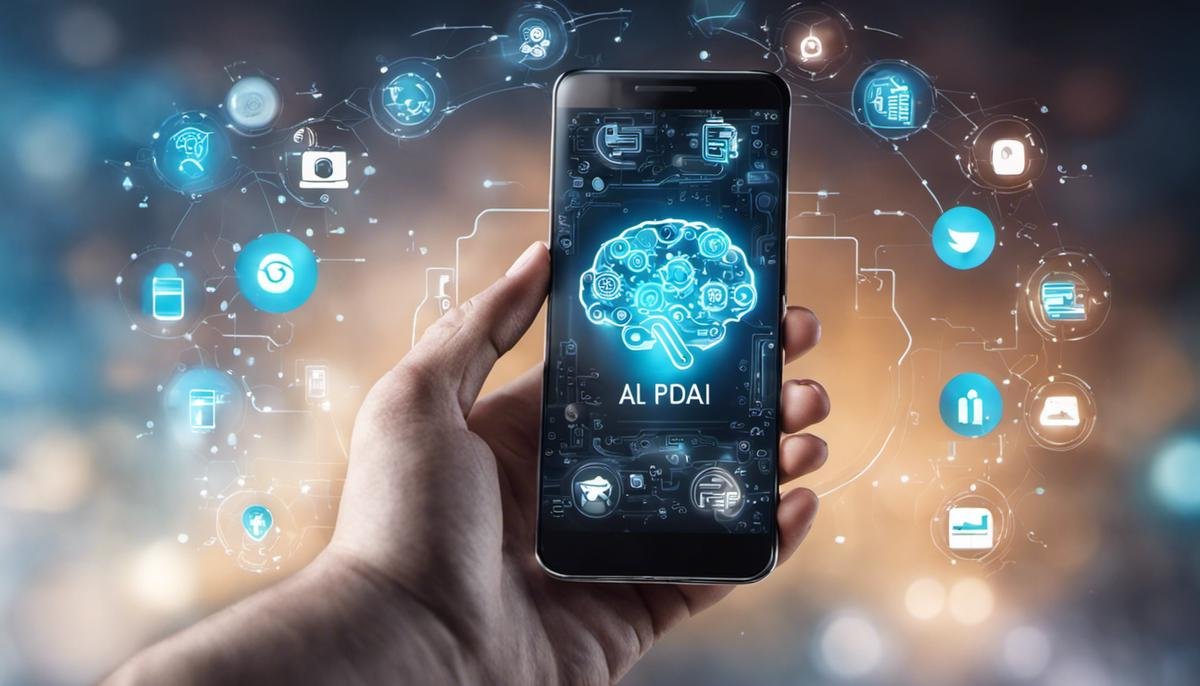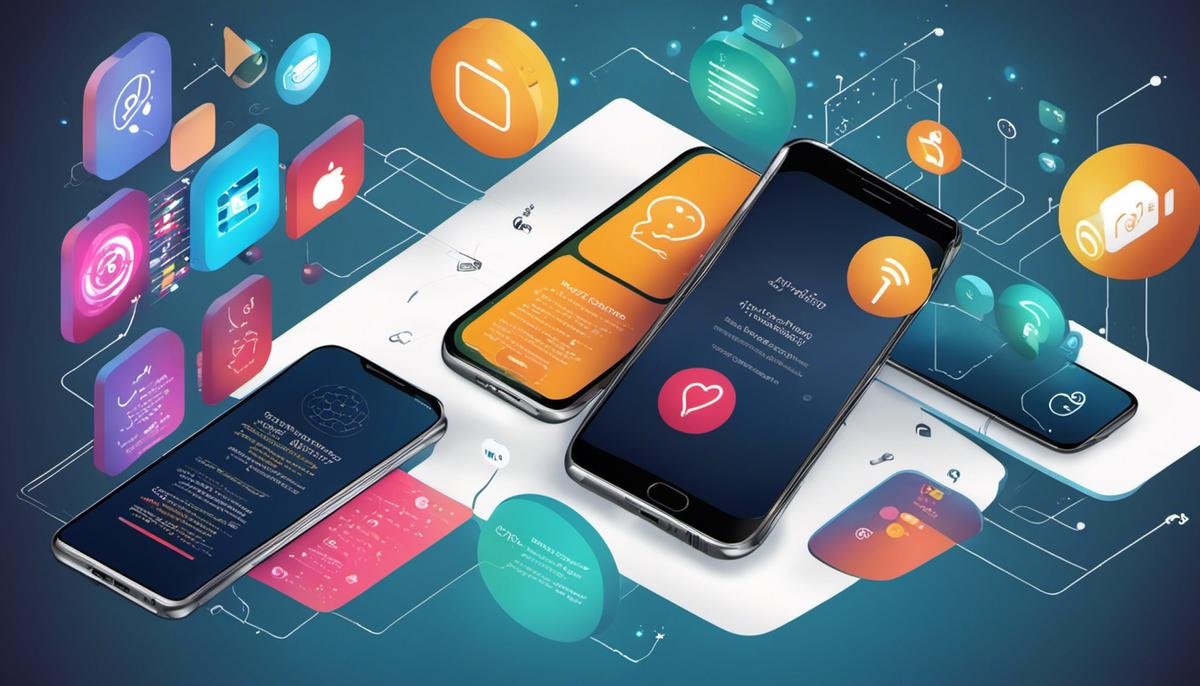As we step more into the digital age, technologies like Artificial Intelligence (AI) are becoming increasingly dominant in our everyday lives. This is especially true in the realm of mobile applications, where AI has emerged as a transformative force, adding new dimensions to user experience and functionality. This engagement focuses on exploring different facets of AI in mobile apps, from comprehending their capabilities to understanding their implications for user experience. Furthermore, it delves into the very pertinent issues of security and privacy while shedding light on the challenges and potential future of AI in the mobile app industry. With an increasing dependency on mobile apps, understanding the role of AI in this domain is essential for both users and developers.
Understanding AI Capabilities in Mobile Apps
AI Capabilities in Mobile Applications: The Current Landscape
AI, or Artificial Intelligence, embodies a broad range of technologies utilized in mobile applications that enable them to learn from user interactions, predict user behavior, and execute tasks traditionally requiring human intelligence. These AI-powered technologies are permeating the mobile app industry, transforming user experiences by offering increased personalization and real-time functionalities.
Voice Recognition: Conversational AI at Work
One of the most evident uses of AI in mobile applications is voice recognition, which powers popular virtual assistants such as Siri, Google Assistant, and Amazon Alexa. This AI capability employs a technology known as Natural Language Processing (NLP) to understand and interpret human speech in context. It allows software to effectively translate spoken language into digital commands, enabling users to control their devices using voice commands, make voice-activated searches, or interact via spoken conversations. Over time, voice recognition technology learns from user interactions, improving its ability to understand and respond accurately to user commands.
Personalization: AI-Driven User Centricity
AI also enables mobile apps to adjust their function and interface according to a user’s needs and preferences. Personalization through AI can be seen in streaming apps like Netflix or Spotify, where algorithms analyze user activities to serve relevant recommendations. Social media platforms use AI to present personalized content feeds based on user likes, shares, and follows. Shopping apps leverage it to suggest products, related items, or promotional deals based on past purchases or browsing history. This AI capability enhances user engagement, satisfaction, and overall app usability.
Predictive Text: AI in Real-Time
Predictive text is another critical AI capability seen in most smartphones. As users type, AI algorithms work behind the scenes to predict the next word or phrase. These suggestions are based on the user’s previous textual inputs and common phrases in the language. As users continue to use predictive text, the AI learns their typing patterns and language usage, consequently improving the prediction accuracy. The inclusion of this AI capability in mobile apps facilitates smoother, faster text input, thereby enhancing user experience and productivity.
Enhancing User Experience with AI
By embedding AI technologies into mobile applications, a more interactive, user-friendly, and efficient platform is created. Think about voice recognition for hands-free control, customized content for increased relevance, or predictive text for easy typing. AI consistently elevates the standard of user experience on mobile apps. It aids in the development of dynamic applications that are proficient, engaging, and context-responsive, revolutionizing the way users interact with their digital gadgets and the wider digital world.

Impacts of AI on User Experience
Transforming User Experience on Mobile Apps with AI
Artificial Intelligence, commonly known as AI, is swiftly altering the face of user experience on mobile applications. Through the utilization of machine learning and predictive analytics, AI distinctly enhances personalization, making user interactions more engaging and satisfying.
AI makes use of personalization as one of its key strategies to achieve this. By analysing user behavior, preferences, and interests, AI algorithms suggest personalized content and recommendations. This could be as simple as Spotify suggesting songs based on tracks you’ve listened to in the past or Netflix recommending movies that align with your viewing history. By creating a personalized user experience, AI fosters a feeling of uniqueness, thereby boosting user engagement and satisfaction.
Efficiency and Intuitiveness
Another key aspect of AI’s impact on user experience is its ability to make mobile apps more efficient and intuitive. Voice recognition and natural language processing, two fundamental AI technologies, allow users to simply voice commands, making the app easier to navigate and use. For example, AI assistants like Siri or Google Assistant understand and execute verbal commands, drastically simplifying the operation of mobile apps for the end-users.
Predictive Functionality
AI technology also improves the user experience by predicting user needs. Through constant analysis of user interactions, AI can anticipate what a user might want to do next, making suggestions or automating tasks. This predictive functionality not only makes apps more efficient, but it also creates a seamless user experience. This ability to anticipate and adapt accordingly can be seen in apps like Google Maps, which predicts traffic and suggests the best routes.
Conversational and Contextual UIs
With increased smartphone use, AI technology is continuously adapting and progressing, making user interfaces more conversational and contextual. Conversational UIs in apps, powered by AI, can engage users in human-like text conversations, while contextual UIs can provide users with what they need in their exact moment of need. Combined, these AI advancements result in mobile apps being simpler to use, more engaging, and ultimately, more enjoyable.
Improved User Support
Furthermore, AI contributes to improving user support and experience as it has the facility of automating customer service through chatbots. These AI-powered chatbots can handle a multitude of user queries simultaneously, delivering timely and efficient assistance. This not only boosts user engagement but also increases conversion rates.
The Game-Changing Influence of AI
Artificial intelligence (AI) has ushered in significant improvements in the sphere of user experience. Notably, the unprecedented efficiency, heightened engagement, and enhanced satisfaction that AI-focused apps such as Netflix, Spotify, or Google Maps bring about, illustrate this change. These apps excellently leverage AI to customize and predict interactions for users, highlighting the transformative potential of AI within the mobile app space. As AI continues to evolve and integrate further, it promises a thrilling future for refining and amplifying user experiences.

Security and Privacy Concerns with AI in Mobile Apps
AI in Mobile Apps: Boosting Capabilities and Raising Data Privacy Issues
No one can dispute the ground-breaking influence of AI on mobile app development. AI has redefined the landscape by giving users more personalized, efficient, and intelligent applications. Its presence can be seen in various contexts, from offering tailored recommendations in shopping apps and predictive searches on Google to powering virtual assistants like Siri or Alexa – making tasks much more manageable and endearing. Simultaneously, it’s important to note the emerging concerns around data privacy and security that have surfaced with such advancements in AI.
Data Privacy Risks in AI-Driven Mobile Apps
Data forms the backbone of AI. These AI-based applications require substantial amounts of data to enable personalized experiences. They can gather a wide range of personal data, including location history, browsing habits, voice commands, personal messages, and biometrics. The data is then typically stored on the servers for processing and prediction purposes. If these data are not handled with adequate protection measures, it can become a fertile ground for hackers, causing a severe breach of privacy.
Moreover, while some information is willingly provided by users, some information is collected covertly without explicit user permission. AI algorithms, in some instances, learn and adapt by analyzing user behavior and patterns, oftentimes unbeknownst to users. This lack of transparency poses a significant challenge for user privacy.
Security Concerns with AI in Mobile Apps
Beyond privacy concerns, the application of AI in mobile apps also raises important security concerns. Cybercriminals can exploit the vulnerabilities present in mobile applications or their AI algorithms for illegal purposes. For example, they can launch sophisticated attacks, feeding manipulated data to compromise the AI algorithm’s performance and reliability – a process known as “adversarial attacks.” Further, once hackers gain unauthorized access to a server storing copious amounts of data, they can manipulate or steal it, leading to widespread security breaches.
Mitigating Privacy and Security Concerns
Addressing these privacy and security issues is crucial to ensure AI’s continued, trusted use in the mobile application landscape. An essential first step users can take is to understand and optimize the privacy settings of their apps and devices. They should regularly review and control what information they share with each application and minimize exposure to potential privacy infringements.
For developers, the key lies in adopting stringent data security measures and ensuring algorithm robustness. Incorporating security and privacy considerations into the design of AI systems—known as Privacy by Design and Security by Design—is vital. This means championing safe data handling practices, implementing robust encryption methods, adopting secure coding techniques, and conducting routine security audits.
Furthermore, transparency and explicit consent from users should be the norm rather than the exception. Regulations like the General Data Protection Regulation (GDPR) are pioneering this, requiring companies to be open about their data practices and obtain informed consent from users before data collection.
In the dawn of the AI-driven era for mobile applications, it’s exciting to imagine the possibilities these advancements hold. However, with any significant leaps in technology, it’s important to stay vigilant against potential security and privacy issues. By maintaining a balanced, knowledgeable, and preemptive approach, users and app developers can fully utilize the far-reaching benefits of AI while mitigating risks.

Challenges and Future Prospects of AI in Mobile Apps
The Practical Challenges of AI Integration in Mobile Apps
Designing and developing AI-fueled mobile applications can be a complex task, and privacy and security are central concerns. AI technology hinges on the analysis of vast quantities of data, which may contain sensitive personal details. Security breaches or data leaks pose tremendous risks and can stir up intense privacy issues.
Another significant hurdle for AI is mastering human language interpretation. The intricate nature of colloquialism, accents, or dialects, and effectively responding to voice commands present unique challenges, particularly for mobile applications incorporating voice-assistant features.
Furthermore, a general deficit of AI knowledge and proficiency can act as a considerable barrier. The realm of artificial intelligence calls for highly qualified professionals who know the art of data management and interpretation, designing algorithms, and seamlessly integrating AI into mobile applications.
Overcoming AI Challenges in Mobile Apps
To overcome these challenges, app developers can embrace practices that can leverage AI benefits while mitigating potential risks. Concerning privacy, security measures such as data encryption and explicit user consent can be established to safeguard user information. OpenAI’s GPT-3 has made considerable strides in natural language processing that app developers can integrate to improve interaction with voice-assistant apps.
Skills shortage can be addressed by offering a comprehensive training program to equip developers with necessary AI skills. Additionally, the use of pre-trained machine learning models, and AI platforms can help lower the barrier to entry in implementing AI in apps, negating the need for deep expertise in the field.
Future Prospects of AI in Mobile Apps
With advancements in AI technology, future prospects in mobile apps include enhanced personalization and optimization. AI is likely to make mobile experiences more personalized and context-sensitive. For example, AI can analyze the user’s behavior and preferences to deliver tailor-made content or recommendations, enhancing customer satisfaction and engagement.
Furthermore, AI is poised to transform the gaming industry. With the integration of AI, mobile games can become more intelligent and adaptive, providing unique and challenging gaming experiences for users.
The health industry is another sector set to benefit from AI in mobile apps. Apps could monitor users’ health status in real-time and provide necessary advice, alerts or remind them to take medication.
Lastly, the integration of AI in mobile apps will pave the way for improved voice assistants. The assistants will become more knowledgeable and learn from the user’s interaction, becoming increasingly efficient at understanding and predicting user needs over time.
However, prospects will come with their own set of challenges that developers will need to address, including improving AI interpretability and managing increased data needs. As AI technology evolves, so too will the tools and strategies used to mitigate these challenges become more advanced, allowing app developers to accurately meet the needs of users.

AI’s role in mobile apps is vast and multifaceted, impacting everything from enhancing the capabilities and the user experience to raising concerns around security and privacy. It offers scope for mobile apps to be more intuitive, accommodating, and efficient. At the same time, it presents challenges that need to be addressed to enable its full potential and ensure user trust. Future prospects of AI in mobile apps promise exciting transformations, promising to revolutionize the sector, given the technological hurdles are overcome. As we gear up for this future, it’s the understanding and efficient application of these AI resources in mobile app development that will determine their ultimate success and acceptance.
















